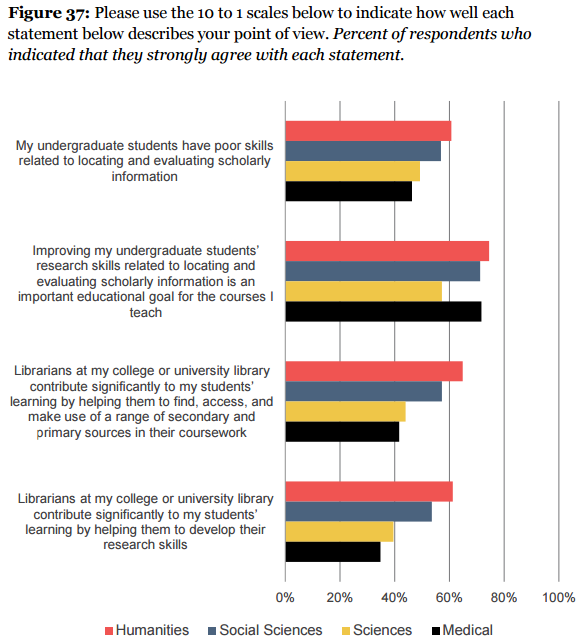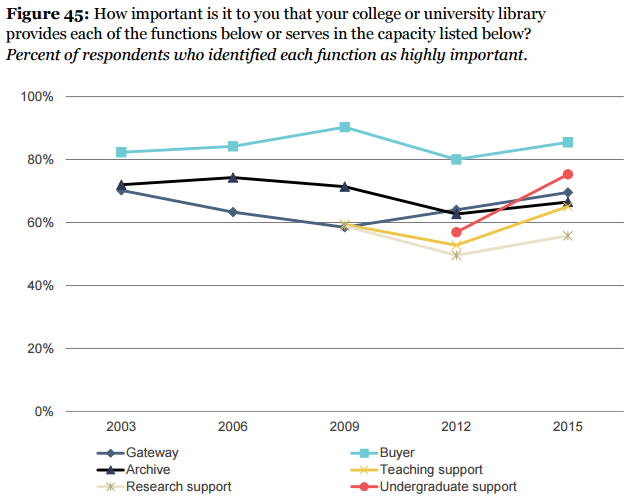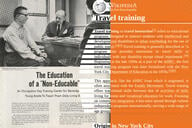You have /5 articles left.
Sign up for a free account or log in.
Faculty members are showing increasing interest in supporting students and improving their learning outcomes, and say the library can play an important role in that work, a new study found.
Ithaka S+R’s latest national faculty survey, released this morning, shows two storylines in higher education intersecting. The results suggest the pressure on colleges to improve retention and completion rates and prepare students for life after college appears to be influencing faculty members, who are more concerned than ever that undergraduates don’t know how to locate and evaluate scholarly information.
At the same time, many faculty members view university libraries -- which are engaged in a process of reinventing themselves and rethinking their services -- as an increasingly important source not only of undergraduate support but also as an archive, a buyer, a gateway to research and more.
“We have a number of findings that show faculty members are paying more attention to students' skills and that they’re looking at the library as a partner,” said Roger C. Schonfeld, director of Ithaka S+R's libraries and scholarly communication program, who co-authored the report. “It suggests real opportunities for universities that wouldn’t necessarily be possible if it was just an administrative initiative rather than a set of perception changes.”
Ithaka S+R, a nonprofit consulting and research company, has conducted the survey -- a wide-ranging exploration of how faculty members feel about information usage and scholarly communication -- every three years since 2000. This year’s edition includes responses from 9,203 faculty members representing all arts and sciences and most professional fields at four-year colleges and universities in the U.S., collected last fall.
In an interview, Schonfeld said faculty members’ thoughts on their own students’ research skills are one of the most interesting developments since the 2012 survey. More than half of respondents (54 percent) described those skills as poor, up from 47 percent in 2012. Faculty members in the humanities were particularly critical, with about six in 10 respondents saying their students struggle.
Most faculty members -- about two-thirds of respondents -- said they see improving undergraduate research skills as an important goal for the courses they teach, but they are not alone in that pursuit. About half of faculty members now say librarians contribute significantly toward students being able to discover and use primary sources in their course work -- “substantial increases” from the 2012 survey.
The increase in the number of faculty who see libraries as a support service for students can be seen in the qualities instructors value in their libraries. Traditionally, faculty members have rated services related to research -- acquiring new journals and monographs, serving as a starting point for research and archiving information -- as the most important aspects of a library. Those functions are still important, but this year’s respondents rated undergraduate support as the second most important service the libraries provide (behind acquisitions).
In fact, respondents in 2015 rated everything libraries do as more important than they did in 2012. The undergraduate support function saw the largest increase, from less than 60 percent in 2012 to about 75 percent in 2015.
Schonfeld pointed out that there are obviously differences between individual colleges and how their libraries are viewed by faculty, but over all, “Libraries writ large can take that as a sign of success,” he said.
Other notable findings include:
- More than half (52 percent) of faculty members said they shape their research and pick their publication outlets based on what they think will work in their favor in tenure and promotion decisions. That is particular true among female respondents (59 percent) compared to male respondents (47 percent) and faculty members in the social sciences (57 percent).
“We know that there are issues around equity, and not just on a male-female basis in higher education,” Schonfeld said. “This is a good example of evidence that we have not solved these problems.”
On a related note, faculty members said some research methods are more important than others. More than half of respondents rated analysis of new quantitative (59 percent) and qualitative data (53 percent) as the most important research activities, while analyzing text, mapping data, using simulations or writing code ranked toward the bottom of the list with less than 20 percent.
- Interest in all-digital scholarly monographs remains flat, even as more faculty members grow comfortable with the idea of an all-digital journal collection. About 75 percent of faculty members said they would be fine if their library stopped subscribing to a print version of a journal but continued offering it electronically. A growing number of faculty members are even warming to the idea that libraries should discard their entire print collections.
That does not apply to print monographs, however. Less than 20 percent of faculty members said they see ebooks catching on in the next five years to the point where print books will be superfluous. Print, respondents said, is easier to read cover to cover, in-depth and skim, while ebooks provide a better way to search and explore references.
“As I look at that finding, it suggests that some of the enthusiasm that faculty members had a few years ago for the potential of digital books … hasn’t been realized,” Schonfeld said.
- Faculty members believe they themselves are best suited to preserve research. More than 80 percent of respondents said they preserve, organize and manage their own data, while less than 10 percent said they rely on libraries to do so. Once a project has reached its end, a majority of respondents (about two-thirds) still said they take responsibility for preserving it, most of them using freely available software. Only about 10 percent said libraries and publishers assume preservation responsibilities.
“There are some real risks here,” Schonfeld said. “There’s a preference for solutions that are seen as self-reliant.”
- Dedicated scholarly databases are losing influence as a starting point for research as library websites and general search engines capture more of the market. In every previous edition of the survey, a plurality of respondents have said they start the research process by visiting a database such as JSTOR. This year, slightly more faculty members (about one-third of respondent) said they start on a general-purpose search engine such as Google.
The results also contain encouraging news for libraries, which have over the last several years invested millions of dollars in discovery services. About one-quarter of faculty members said they start their research on the library’s website, a jump from about 20 percent in 2012.
“The flux there is really interesting, and it’s important,” Schonfeld said. “It’s really powerful to see the mind share of faculty members shift away from publishers or other kinds of specific electronic resources and toward these newly developed library discovery services and general web search.”






